begin quote from: Questions over Beirut explosion
Ammonium nitrate stored in a warehouse linked to catastrophic Beirut explosion
(CNN)A warehouse storing thousands of tons of unsecured highly explosive material has emerged as a possible source of the massive blast that ripped through the Lebanese capital on Tuesday, killing at least 80 people, injuring 4,000 and sending a shock wave across the city that damaged buildings and blew out windows up to 10 kilometers (6 miles) away.Lebanon's Prime Minister Hassan Diab said that 2,750 metric tons of ammonium nitrate, which is typically used as an agricultural fertilizer, had been stored for six years at a port warehouse without safety measures, "endangering the safety of citizens," according to a statement.It's still not exactly clear what led to the ignition that wiped out entire streets across the seaside capital.Initial reports in state media blamed the blast on a major fire at a firecrackers warehouse near the port, that likely spread to nearby buildings. However, the Prime Minister's account appeared to be backed by Lebanon's General Security chief Abbas Ibrahim, who said a "highly explosive material" had been confiscated years earlier and stored in the warehouse, just minutes' walk from Beirut's shopping and nightlife districts.As Beirut's 4 million residents wake to the full horror and scale of the damage to their city, lives, and livelihoods, questions will be asked about why such large quantities of the dangerous chemical were allowed to be stored in the middle of the city without adequate safety measures, and who is responsible.Immediate concerns remain with the casualties. Hospitals -- already stretched from the ongoing coronavirus pandemic -- are inundated with the wounded and while the death toll steadily rose through Tuesday and into Wednesday, the true cost of life may not be known for several days as more bodies are pulled from the wreckage and the scale of the devastation is realized. Relatives of the missing are scouring hospitals looking for their loved ones and aid agency Save the Children warned of children being among those unaccounted for.Lebanon's Health Minister Hamad Hassan said on national television Wednesday that the death toll will likely increase and that four hospitals are out of service because of damage from the explosion.The blast also comes at a difficult time for the cash-strapped country, which has been ravaged by economic and political turmoil exacerbated by the fallout from the Covid-19 outbreak.Though Lebanon has only confirmed 5,062 coronavirus cases and 65 related deaths, according to data from Johns Hopkins University, pandemic-related restrictions have further exacerbated the country's deep and long-running financial crisis.Violent protests have erupted over rising hunger and poverty, which has soared to over 50%, and scenes of people scavenging garbage dumps for basic necessities have become commonplace.Power outages are common in the capital, compounding pressures on basic services to provide for the injured.Prime Minister Diab has launched an investigation into the explosion, saying he "will not rest until we find those responsible for what happened, hold them accountable, and impose maximum punishment."Ammonium nitrate is a highly volatile material that's used in agricultural fertilizer and high-grade explosives. Two US tons of the chemical was used in the 1995 Oklahoma City bombing, a domestic terror attack that killed 169 people. Following Tuesday's explosion, the United States Embassy in Beirut urged those in the area to "stay indoors and wear masks if available" due to reports of toxic gases released from the blast. Photos: Huge explosion rocks BeirutA man sits near the site of the blast.Hide Caption12 of 22
Photos: Huge explosion rocks BeirutA man sits near the site of the blast.Hide Caption12 of 22 Photos: Huge explosion rocks BeirutFirefighters work at the scene on Tuesday.Hide Caption13 of 22
Photos: Huge explosion rocks BeirutFirefighters work at the scene on Tuesday.Hide Caption13 of 22 Photos: Huge explosion rocks BeirutA wounded person is carried after the blast.Hide Caption14 of 22
Photos: Huge explosion rocks BeirutA wounded person is carried after the blast.Hide Caption14 of 22 Photos: Huge explosion rocks BeirutThe explosion was near the port in the Lebanese capital.Hide Caption15 of 22
Photos: Huge explosion rocks BeirutThe explosion was near the port in the Lebanese capital.Hide Caption15 of 22 Photos: Huge explosion rocks BeirutSmoke billows following the explosion.Hide Caption16 of 22
Photos: Huge explosion rocks BeirutSmoke billows following the explosion.Hide Caption16 of 22 Photos: Huge explosion rocks BeirutA wounded man walks near the scene.Hide Caption17 of 22
Photos: Huge explosion rocks BeirutA wounded man walks near the scene.Hide Caption17 of 22 Photos: Huge explosion rocks BeirutPeople gather by damaged buildings after the blast.Hide Caption18 of 22
Photos: Huge explosion rocks BeirutPeople gather by damaged buildings after the blast.Hide Caption18 of 22 Photos: Huge explosion rocks BeirutFirefighters use a water hose on flaming debris.Hide Caption19 of 22
Photos: Huge explosion rocks BeirutFirefighters use a water hose on flaming debris.Hide Caption19 of 22 Photos: Huge explosion rocks BeirutRed smoke rises after the explosion, which could be felt for miles. "What I felt was that it was an earthquake," Beirut resident Rania Masri told CNN.Hide Caption20 of 22
Photos: Huge explosion rocks BeirutRed smoke rises after the explosion, which could be felt for miles. "What I felt was that it was an earthquake," Beirut resident Rania Masri told CNN.Hide Caption20 of 22 Photos: Huge explosion rocks BeirutPeople walk near the scene of the explosion.Hide Caption21 of 22
Photos: Huge explosion rocks BeirutPeople walk near the scene of the explosion.Hide Caption21 of 22 Photos: Huge explosion rocks BeirutA man reacts at the scene soon after the explosion.Hide Caption22 of 22
Photos: Huge explosion rocks BeirutA man reacts at the scene soon after the explosion.Hide Caption22 of 22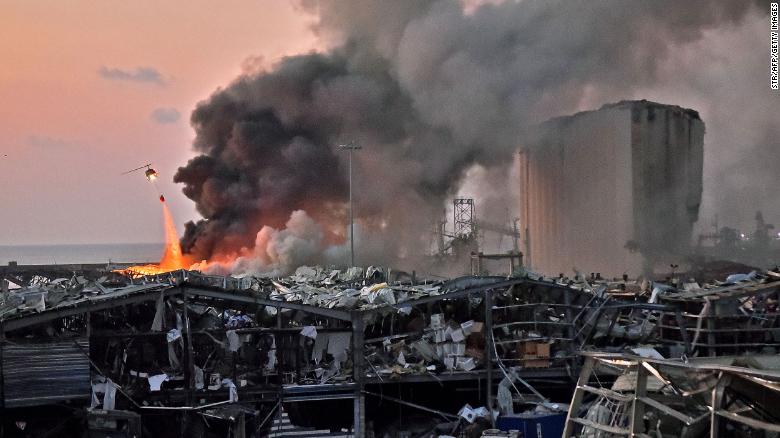 Photos: Huge explosion rocks BeirutA helicopter fights a fire at the scene of an explosion in Beirut, Lebanon, on Tuesday, August 4.Hide Caption1 of 22
Photos: Huge explosion rocks BeirutA helicopter fights a fire at the scene of an explosion in Beirut, Lebanon, on Tuesday, August 4.Hide Caption1 of 22 Photos: Huge explosion rocks BeirutRescue crews search a street for survivors on Tuesday night. "People are asking the emergency department about their loved ones, and it is difficult to search at night because there is no electricity," Health Minister Hamad Hassan told the Reuters news agency. "We are facing a real catastrophe and need time to assess the extent of damages."Hide Caption2 of 22
Photos: Huge explosion rocks BeirutRescue crews search a street for survivors on Tuesday night. "People are asking the emergency department about their loved ones, and it is difficult to search at night because there is no electricity," Health Minister Hamad Hassan told the Reuters news agency. "We are facing a real catastrophe and need time to assess the extent of damages."Hide Caption2 of 22 Photos: Huge explosion rocks BeirutA wounded man is helped as he walks through debris following the explosion.Hide Caption3 of 22
Photos: Huge explosion rocks BeirutA wounded man is helped as he walks through debris following the explosion.Hide Caption3 of 22 Photos: Huge explosion rocks BeirutSmoke rises after the blast. This image was obtained from a video on social media.Hide Caption4 of 22
Photos: Huge explosion rocks BeirutSmoke rises after the blast. This image was obtained from a video on social media.Hide Caption4 of 22 Photos: Huge explosion rocks BeirutLebanese Red Cross officers carry an injured woman on Tuesday night.Hide Caption5 of 22
Photos: Huge explosion rocks BeirutLebanese Red Cross officers carry an injured woman on Tuesday night.Hide Caption5 of 22 Photos: Huge explosion rocks BeirutA building's facade is shattered after Tuesday's explosion.Hide Caption6 of 22
Photos: Huge explosion rocks BeirutA building's facade is shattered after Tuesday's explosion.Hide Caption6 of 22 Photos: Huge explosion rocks BeirutWounded people wait to received help outside a hospital. Emergency wards have been inundated.Hide Caption7 of 22
Photos: Huge explosion rocks BeirutWounded people wait to received help outside a hospital. Emergency wards have been inundated.Hide Caption7 of 22 Photos: Huge explosion rocks BeirutAn investigation into the explosion was announced by Lebanese Prime Minister Hassan Diab.Hide Caption8 of 22
Photos: Huge explosion rocks BeirutAn investigation into the explosion was announced by Lebanese Prime Minister Hassan Diab.Hide Caption8 of 22 Photos: Huge explosion rocks BeirutPeople run for cover following the explosion. Bachar Ghattas, an eyewitness, described scenes of chaos: "You can see injured people all over the streets in Beirut, glass all over the place, cars are damaged. It is like an apocalypse."Hide Caption9 of 22
Photos: Huge explosion rocks BeirutPeople run for cover following the explosion. Bachar Ghattas, an eyewitness, described scenes of chaos: "You can see injured people all over the streets in Beirut, glass all over the place, cars are damaged. It is like an apocalypse."Hide Caption9 of 22 Photos: Huge explosion rocks BeirutInjured people sit on a street after the blast.Hide Caption10 of 22
Photos: Huge explosion rocks BeirutInjured people sit on a street after the blast.Hide Caption10 of 22 Photos: Huge explosion rocks BeirutLebanese soldiers watch as a helicopter fights a fire at the scene of the explosion.Hide Caption11 of 22
Photos: Huge explosion rocks BeirutLebanese soldiers watch as a helicopter fights a fire at the scene of the explosion.Hide Caption11 of 22 Photos: Huge explosion rocks BeirutA man sits near the site of the blast.Hide Caption12 of 22
Photos: Huge explosion rocks BeirutA man sits near the site of the blast.Hide Caption12 of 22 Photos: Huge explosion rocks BeirutFirefighters work at the scene on Tuesday.Hide Caption13 of 22
Photos: Huge explosion rocks BeirutFirefighters work at the scene on Tuesday.Hide Caption13 of 22 Photos: Huge explosion rocks BeirutA wounded person is carried after the blast.Hide Caption14 of 22
Photos: Huge explosion rocks BeirutA wounded person is carried after the blast.Hide Caption14 of 22 Photos: Huge explosion rocks BeirutThe explosion was near the port in the Lebanese capital.Hide Caption15 of 22
Photos: Huge explosion rocks BeirutThe explosion was near the port in the Lebanese capital.Hide Caption15 of 22 Photos: Huge explosion rocks BeirutSmoke billows following the explosion.Hide Caption16 of 22
Photos: Huge explosion rocks BeirutSmoke billows following the explosion.Hide Caption16 of 22 Photos: Huge explosion rocks BeirutA wounded man walks near the scene.Hide Caption17 of 22
Photos: Huge explosion rocks BeirutA wounded man walks near the scene.Hide Caption17 of 22 Photos: Huge explosion rocks BeirutPeople gather by damaged buildings after the blast.Hide Caption18 of 22
Photos: Huge explosion rocks BeirutPeople gather by damaged buildings after the blast.Hide Caption18 of 22 Photos: Huge explosion rocks BeirutFirefighters use a water hose on flaming debris.Hide Caption19 of 22
Photos: Huge explosion rocks BeirutFirefighters use a water hose on flaming debris.Hide Caption19 of 22 Photos: Huge explosion rocks BeirutRed smoke rises after the explosion, which could be felt for miles. "What I felt was that it was an earthquake," Beirut resident Rania Masri told CNN.Hide Caption20 of 22
Photos: Huge explosion rocks BeirutRed smoke rises after the explosion, which could be felt for miles. "What I felt was that it was an earthquake," Beirut resident Rania Masri told CNN.Hide Caption20 of 22 Photos: Huge explosion rocks BeirutPeople walk near the scene of the explosion.Hide Caption21 of 22
Photos: Huge explosion rocks BeirutPeople walk near the scene of the explosion.Hide Caption21 of 22 Photos: Huge explosion rocks BeirutA man reacts at the scene soon after the explosion.Hide Caption22 of 22
Photos: Huge explosion rocks BeirutA man reacts at the scene soon after the explosion.Hide Caption22 of 22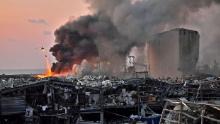 Photos: Huge explosion rocks BeirutA helicopter fights a fire at the scene of an explosion in Beirut, Lebanon, on Tuesday, August 4.Hide Caption1 of 22
Photos: Huge explosion rocks BeirutA helicopter fights a fire at the scene of an explosion in Beirut, Lebanon, on Tuesday, August 4.Hide Caption1 of 22 Photos: Huge explosion rocks BeirutRescue crews search a street for survivors on Tuesday night. "People are asking the emergency department about their loved ones, and it is difficult to search at night because there is no electricity," Health Minister Hamad Hassan told the Reuters news agency. "We are facing a real catastrophe and need time to assess the extent of damages."Hide Caption2 of 22
Photos: Huge explosion rocks BeirutRescue crews search a street for survivors on Tuesday night. "People are asking the emergency department about their loved ones, and it is difficult to search at night because there is no electricity," Health Minister Hamad Hassan told the Reuters news agency. "We are facing a real catastrophe and need time to assess the extent of damages."Hide Caption2 of 22 Photos: Huge explosion rocks BeirutA wounded man is helped as he walks through debris following the explosion.Hide Caption3 of 22
Photos: Huge explosion rocks BeirutA wounded man is helped as he walks through debris following the explosion.Hide Caption3 of 22 Photos: Huge explosion rocks BeirutSmoke rises after the blast. This image was obtained from a video on social media.Hide Caption4 of 22
Photos: Huge explosion rocks BeirutSmoke rises after the blast. This image was obtained from a video on social media.Hide Caption4 of 22 Photos: Huge explosion rocks BeirutLebanese Red Cross officers carry an injured woman on Tuesday night.Hide Caption5 of 22
Photos: Huge explosion rocks BeirutLebanese Red Cross officers carry an injured woman on Tuesday night.Hide Caption5 of 22 Photos: Huge explosion rocks BeirutA building's facade is shattered after Tuesday's explosion.Hide Caption6 of 22
Photos: Huge explosion rocks BeirutA building's facade is shattered after Tuesday's explosion.Hide Caption6 of 22 Photos: Huge explosion rocks BeirutWounded people wait to received help outside a hospital. Emergency wards have been inundated.Hide Caption7 of 22
Photos: Huge explosion rocks BeirutWounded people wait to received help outside a hospital. Emergency wards have been inundated.Hide Caption7 of 22 Photos: Huge explosion rocks BeirutAn investigation into the explosion was announced by Lebanese Prime Minister Hassan Diab.Hide Caption8 of 22
Photos: Huge explosion rocks BeirutAn investigation into the explosion was announced by Lebanese Prime Minister Hassan Diab.Hide Caption8 of 22 Photos: Huge explosion rocks BeirutPeople run for cover following the explosion. Bachar Ghattas, an eyewitness, described scenes of chaos: "You can see injured people all over the streets in Beirut, glass all over the place, cars are damaged. It is like an apocalypse."Hide Caption9 of 22
Photos: Huge explosion rocks BeirutPeople run for cover following the explosion. Bachar Ghattas, an eyewitness, described scenes of chaos: "You can see injured people all over the streets in Beirut, glass all over the place, cars are damaged. It is like an apocalypse."Hide Caption9 of 22 Photos: Huge explosion rocks BeirutInjured people sit on a street after the blast.Hide Caption10 of 22
Photos: Huge explosion rocks BeirutInjured people sit on a street after the blast.Hide Caption10 of 22 Photos: Huge explosion rocks BeirutLebanese soldiers watch as a helicopter fights a fire at the scene of the explosion.Hide Caption11 of 22
Photos: Huge explosion rocks BeirutLebanese soldiers watch as a helicopter fights a fire at the scene of the explosion.Hide Caption11 of 22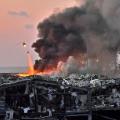
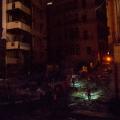
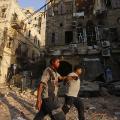
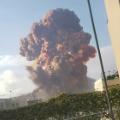
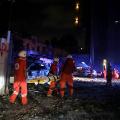
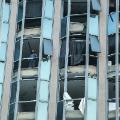
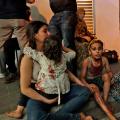
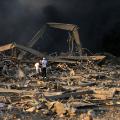
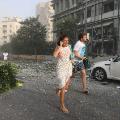
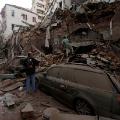
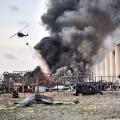
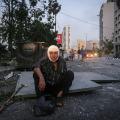
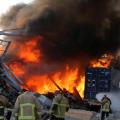
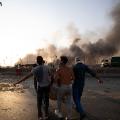
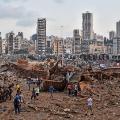
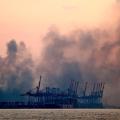
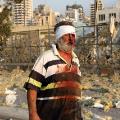
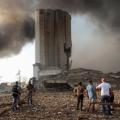
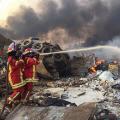
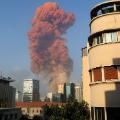
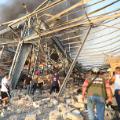
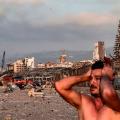 However, Anthony May, a retired ATF explosives investigator for the US government, said that the bright or dark red cloud seen in videos of the blast "is not consistent with ammonium nitrate." The telltale sign of the compound would be a yellow smoke cloud, he said."I'm not saying that ammonium nitrate was not involved in this, it may have been but it appears that there were other items in there as well," May said.The amount of explosives and the shockwaves created by the blast, May said, "is typical of what would be equivalent to a kiloton nuclear bomb going off as far as the explosive weight is concerned.""There was no nuclear material that we know of involved in this, but the shock wave generated, the blast wave generated is at equivalent to a small nuclear device," May said.Adding to the confusion of what caused the incident, US President Donald Trump offered sympathy and assistance to the people of Lebanon, referring to the incident as a "terrible attack."Three US Defense Department officials later contradicted the President's comments, saying that as of Tuesday night there was no indication that the explosion was an "attack" and Lebanese officials have not called the explosion an attack.Other world leaders, including from Israel, the United Kingdom, France, Turkey, Qatar, Jordan and Spain have offered support and humanitarian assistance to Lebanon.
However, Anthony May, a retired ATF explosives investigator for the US government, said that the bright or dark red cloud seen in videos of the blast "is not consistent with ammonium nitrate." The telltale sign of the compound would be a yellow smoke cloud, he said."I'm not saying that ammonium nitrate was not involved in this, it may have been but it appears that there were other items in there as well," May said.The amount of explosives and the shockwaves created by the blast, May said, "is typical of what would be equivalent to a kiloton nuclear bomb going off as far as the explosive weight is concerned.""There was no nuclear material that we know of involved in this, but the shock wave generated, the blast wave generated is at equivalent to a small nuclear device," May said.Adding to the confusion of what caused the incident, US President Donald Trump offered sympathy and assistance to the people of Lebanon, referring to the incident as a "terrible attack."Three US Defense Department officials later contradicted the President's comments, saying that as of Tuesday night there was no indication that the explosion was an "attack" and Lebanese officials have not called the explosion an attack.Other world leaders, including from Israel, the United Kingdom, France, Turkey, Qatar, Jordan and Spain have offered support and humanitarian assistance to Lebanon.Apocalyptic scenes akin to 'Hiroshima'
The explosion, which happened just after 6 p.m. local time (11 a.m. ET), tore through the city and wreaked havoc on nearly all of Beirut's quarters, registering as a 3.3 magnitude earthquake in the Lebanese capital.Footage captured the injured staggering through streets in the capital; and ambulances, cars and military vehicles packed with the wounded.One resident said the scenes looked "like an apocalypse," another said the port was "totally destroyed.""You can see injured people all over the streets in Beirut, glass all over the place, cars are damaged," said Bachar Ghattas, another resident. "It is very, very frightening what is happening right now, and people are freaking out. The emergency services are overwhelmed."The official residence of Lebanon's President, the headquarters of former Prime Minister Saad Hariri, and CNN's bureau in downtown Beirut were damaged. Homes as far as 10 kilometers (6 miles) away were also damaged, according to witnesses.The city's governor Marwan Abboud said the scene reminded him of the atomic bomb blasts at the end of the Second World War in "Hiroshima and Nagasaki.""In my life I haven't seen destruction on this scale," Abboud said. "This is a national catastrophe."Hospitals in Beirut were overwhelmed with the wounded and doctors conducted triage on dozens of injured people in car parks and sidewalks. Some were so full they were turning people away, one witness said."The emergency room looked like a war had begun, the children -- their hands, their legs, I couldn't believe what I was seeing," said Serge Mahdessian, a hairdresser in Beirut.Open lots turned into makeshift field hospitals as people pulled themselves and their loved ones out of the rubble of their homes. Some had broken limbs, others had been showered with shards of glass. Some patients were unconscious. One of Beirut's major hospitals, Hotel Dieu, received around 400 injured patients, an employee told CNN.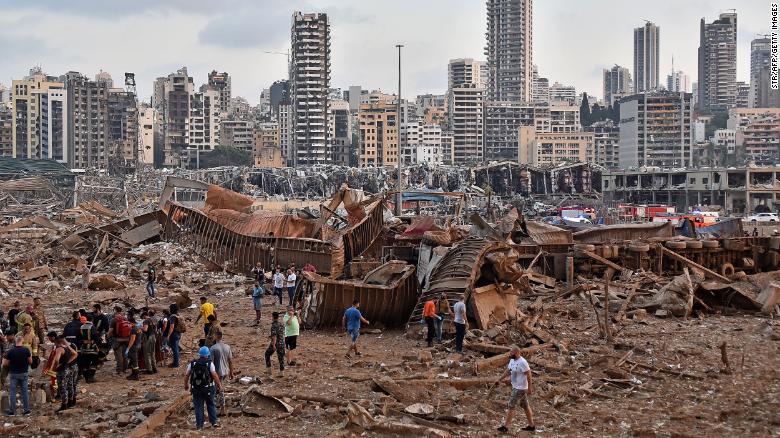 The scene of an explosion near the the port in the Lebanese capital Beirut on August 4, 2020.The Lebanese Red Cross implored the public on Twitter for blood donations to help the wounded and said it has opened triage centers and first aid stations to help those with non-critical injuries. All its ambulances across the entire country were dispatched to the capital to support with the rescue and evacuation of patients.Australian Prime Minister Scott Morrison said at least one Australian was killed in the blast and the Australian Embassy building has been "significantly compromised."One Japanese national suffered a minor injury, according to Japanese Chief Cabinet Secretary Yoshihide Suga. South Korea's foreign ministry said its embassy in Beirut sustained minor damage but had not received any reports of South Korean victims.CNN's Charbel Mayo, Angus Watson, Yoko Wakatsuki, Jake Kwon, Barbara Starr, Ryan Browne, Joshua Berlinger, Raja Razek, Samantha Beech, Schams Elwazer, Mohammed Tawfeeq, Tara John, Alessandria Masi, Nada AlTaher, Hamdi Alkhshali, Amir Tal, Andrew Carey, Jennifer Hansler and Paul Murphy contributed to this report.
The scene of an explosion near the the port in the Lebanese capital Beirut on August 4, 2020.The Lebanese Red Cross implored the public on Twitter for blood donations to help the wounded and said it has opened triage centers and first aid stations to help those with non-critical injuries. All its ambulances across the entire country were dispatched to the capital to support with the rescue and evacuation of patients.Australian Prime Minister Scott Morrison said at least one Australian was killed in the blast and the Australian Embassy building has been "significantly compromised."One Japanese national suffered a minor injury, according to Japanese Chief Cabinet Secretary Yoshihide Suga. South Korea's foreign ministry said its embassy in Beirut sustained minor damage but had not received any reports of South Korean victims.CNN's Charbel Mayo, Angus Watson, Yoko Wakatsuki, Jake Kwon, Barbara Starr, Ryan Browne, Joshua Berlinger, Raja Razek, Samantha Beech, Schams Elwazer, Mohammed Tawfeeq, Tara John, Alessandria Masi, Nada AlTaher, Hamdi Alkhshali, Amir Tal, Andrew Carey, Jennifer Hansler and Paul Murphy contributed to this report.
To the best of my ability I write about my experience of the Universe Past, Present and Future
Top 10 Posts This Month
- Rosamund Pike: Star of New Amazon Prime Series "Wheel of Time"
- Belize Barrier Reef coral reef system
- SNAP rulings ease shutdown pressure as Thune rebuffs Trump call to end filibuster
- Flame (the Giant Pacific Octopus) whose species began here on earth before they were taken to another planet by humans in our near future
- Learning to live with Furosemide in relation to Edema
- I put "Blue Sphere" into the search engine for my site and this is what came up.
- Earthquake Scientists Say It's Time to Start Paying Attention to Antarctica
- Siege of Yorktown 1781
- Nine dead, dozens injured in crowd surge at Hindu temple in southern India
- 1. The Hawaiian god Kanaloa takes the form of an octopus.































































No comments:
Post a Comment